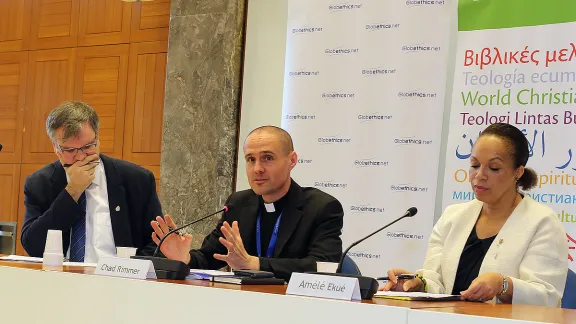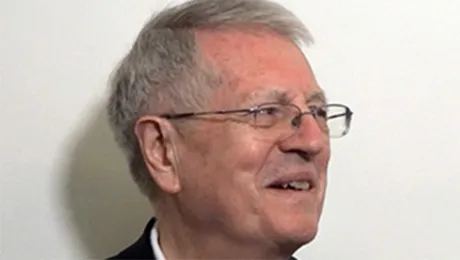
From left to right: Prof. Rudolf Von Sinner (EST), Rev. Dr Chad Rimmer (Study Secretary for Lutheran Theology and Practice) and and Prof. Amélé Ekué (Bossey) at the GlobeTheoLib Consortium on 13 April in Geneva, Switzerland.
“Help the faithful critique unjust discourses”
(LWI) - The church must continue telling faith stories, including those of differently abled, indigenous or marginalised Christians, to keep from “domesticating” the gospel, Lutheran educator Rev. Dr Chad Rimmer said.
Speaking at the GlobeTheoLib Consortium on 13 April at Geneva, Switzerland, the Study Secretary for Lutheran Theology and Practice for the Lutheran World Federation (LWF), said widening theological ‘data’ helps the church keep its critical edge.
“By telling the narrative of the Divine Other each time we gather, we are moved by an encounter with the truth of God revealed in the world. By telling the narratives of the others, we can be motivated by an encounter with the truth of their being in the world,” he added.
Rimmer was reflecting on the implications for theological education and the study of ethics arising from the 14th Conference on World Mission and Evangelism (CWME), in Arusha, Tanzania, in March under the theme, Moving in the Spirit: Called to Transforming Discipleship.
Recalling participants at Arusha suggesting that the central task of mission and evangelism today is to read the signs of the times, he noted that this approach resonates with the call of the prophets and Jesus.
“In order to transform oppressive systems of power we need to help the faithful develop a capacity to critique the logic of unjust discourses,” Rimmer said.
A truly transformational pedagogy is going to root the learner in the sources of knowledge and then encourage them to grow their own fruits.
Theology - the encounter with the reality of the other
The Arusha “Call to Discipleship” focused on “death-dealing forces,” including nationalism, militarism, exclusionary neo-liberal economics, and the loss of land and human rights, calling for a vision promoting truth, reconciliation and peace.
This raises questions about how theological education might help change people and society, and Rimmer called for transformative pedagogy that encourages learners to discover their own moral imagination.
Rimmer appreciated CWME emphasis on the role of storytelling, noting that the way to transform lives isn’t always by providing more information, but by telling stories.
The transformational quality of theology, ie the formation that moves us from common to critical sense or gives us that new set of eyes to see and read the signs of the times, is the encounter with the reality of the other.
A person’s story isn’t information about what happened. A story is an invitation to encounter a new reality revealed by the story.
“A person’s story isn’t information about what happened. A story is an invitation to encounter a new reality revealed by the story,” Rimmer emphasized.
The theological ethicist told the GlobeTheoLib Consortium that the church, as an embodied, Eucharistic community in the world, is formative. In this way Lutherans affirm that Christian faith is based on an encounter with the Word, Christ revealed from outside of us.”
The Arusha statement notes that the Christian’s relationship with the Holy Spirit as experienced in the Eucharistic community motivates the faithful to transformation. Lutherans, Rimmer added, are motivated by Christ’s presence in Scripture and faith to transform church and society.
“The experience of being connected to Christ in the Holy Spirit motivates us to reform or transform oppressive systems,” Rimmer concluded.


